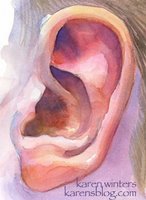
It is well known that
Thomas Edison
was deaf, but later in life, when he was famous (to say the least),
a specialist told him that it might be possible to repair his
hearing. However Edison declined the offer, saying that this way
he could hear when he wanted to hear (and sometimes he heard things
to his advantage that others obviously did not intend for him to hear).
It was a sort of tranquility on demand.
This brings up several questions in matters of morality, of ethics.
Was this honest, to pretend what was not (entirely) so? How many
of us tell others everything we know? Should we, no matter how
we acquire information? Why was Edison permitted to be left alone
to work productively because of his "affliction", when otherwise
his time (like ours) might have been taken up by someone wanting
to sell him some thing or some idea?
To be sure, it was sneaky, but who isn't? As Jesus said, "Let him
who is without sin cast the first stone". Now think of
all that Edison accomplished —
and of the thousands of things he tried that did not succeed,
which he viewed as successful because he wouldn't try them again.
Apparently, Edison did not regard himself as lonely, for he could
communicate with others when he cared to. Another famous man who
valued being left along was
Alexander Graham Bell,
who often spent weekends on his houseboat to get away from
the telephone.
My title is a question, and the answer is: Define "deaf". Hearing,
like sight, mobility, and health in general, is so involved with
other considerations that we can only say, as in most matters,
"it depends".